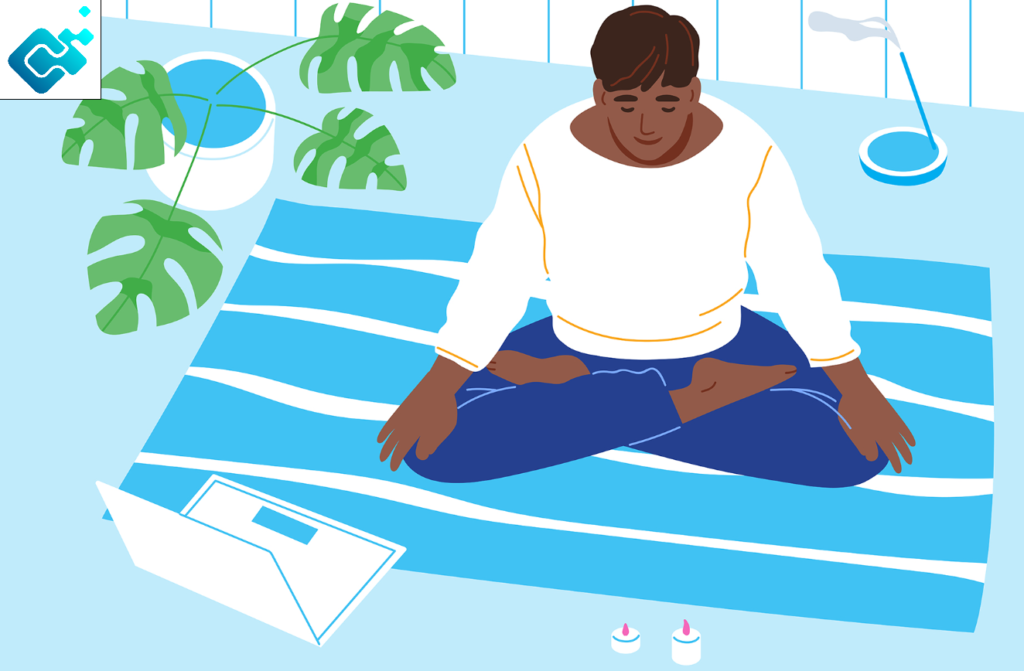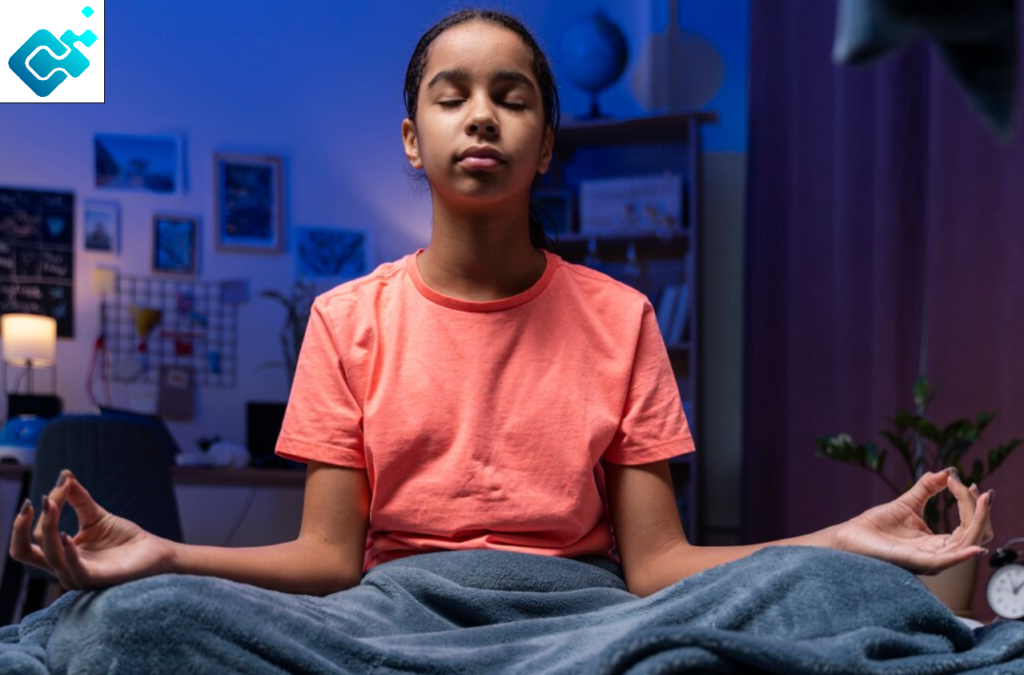A Detailed Article About Meditation for Anxiety and Sleep: Meditation is a powerful tool for managing anxiety and improving sleep quality. By calming the mind and reducing stress levels, meditation can help you achieve a state of relaxation that promotes better rest and alleviates anxiety symptoms. Whether you’re struggling with restless nights or overwhelming anxiety, incorporating meditation into your daily routine can offer substantial benefits. This guide will walk you through the best practices, techniques, and insights into how meditation can specifically help with anxiety and sleep.
What is Meditation and How Does it Help with Anxiety and Sleep?
Meditation is a mental practice that involves focusing the mind, often through breath control, mindfulness, or concentration techniques, to achieve a state of mental clarity and emotional calm. It helps reduce the body’s stress response, which can be particularly beneficial for those suffering from anxiety and sleep disturbances. By engaging in meditation, you train your brain to focus, stay present, and manage your emotional responses more effectively. This can lead to a reduction in anxiety symptoms and improved sleep patterns.
Why Meditation Works for Anxiety
Meditation works for anxiety by engaging the parasympathetic nervous system, which is responsible for rest and relaxation. When you’re anxious, your body is in a heightened state of alertness due to the activation of the sympathetic nervous system (the fight-or-flight response). Meditation helps to counteract this by slowing down the heart rate, lowering blood pressure, and reducing the levels of stress hormones in the body. Over time, regular practice can rewire your brain to respond more calmly to stressors.
How Meditation Improves Sleep
Meditation improves sleep by helping you unwind and quiet the mind before bedtime. It reduces the mental clutter that often keeps you awake, such as worries about the future or dwelling on past events. Techniques like mindfulness meditation, body scan, and guided imagery can help you transition into a relaxed state, making it easier to fall asleep and stay asleep. Additionally, meditation can improve sleep quality by reducing symptoms of insomnia and promoting deeper, more restorative sleep cycles.
Best Meditation Techniques for Anxiety and Sleep
1. Mindfulness Meditation
Mindfulness Meditation involves paying attention to your thoughts, emotions, and sensations in the present moment without judgment. This practice helps you become more aware of your anxiety triggers and how they manifest in your body. By observing these thoughts and feelings without reacting, you can reduce their power over you. For sleep, mindfulness meditation can help quiet a racing mind, making it easier to drift off.
How to Practice Mindfulness Meditation
- Find a Quiet Space: Sit or lie down in a comfortable position.
- Focus on Your Breath: Pay attention to your breath as it moves in and out of your body.
- Notice Your Thoughts: As thoughts arise, acknowledge them without judgment and gently return your focus to your breath.
- Practice Regularly: Aim for at least 5-10 minutes a day, gradually increasing the time as you become more comfortable.
2. Guided Meditation
Guided Meditation involves listening to a narrator who guides you through mental images or scenarios that promote relaxation. This type of meditation can be particularly helpful for beginners or those who struggle to meditate on their own. Guided meditations specifically designed for anxiety and sleep can help you focus on calming imagery and positive affirmations, leading to a more relaxed state.
Tips for Guided Meditation
- Use Apps or Online Resources: There are many free guided meditation resources available, such as apps like Calm, Headspace, or YouTube channels dedicated to sleep and anxiety relief.
- Set a Routine: Try to meditate at the same time each day, especially before bed, to create a consistent routine that signals your body it’s time to relax.
3. Body Scan Meditation
Body Scan Meditation is a technique where you mentally scan your body from head to toe, noticing any areas of tension and consciously relaxing them. This method is highly effective for both anxiety and sleep as it promotes a deep sense of physical relaxation and helps you release the day’s stress.
How to Perform a Body Scan
- Lie Down Comfortably: Start by lying in bed or on a yoga mat.
- Close Your Eyes: Take a few deep breaths to settle into your body.
- Scan Your Body: Begin at the top of your head and slowly move your attention down, noticing any tension or discomfort.
- Relax Each Part: As you focus on each part of your body, consciously relax it before moving on to the next.

Benefits of Regular Meditation Practice
Reduces Anxiety and Stress Levels
Regular meditation practice can lead to significant reductions in anxiety and stress levels. By consistently calming the mind and body, meditation helps lower the production of cortisol, the primary stress hormone. This not only makes you feel more at ease but also has long-term health benefits, such as improved cardiovascular health and immune function.
Enhances Sleep Quality
By incorporating meditation into your nightly routine, you can improve sleep onset and duration. Meditation helps to quiet the mind and body, making it easier to fall asleep and stay asleep through the night. This can be particularly beneficial for those who suffer from insomnia or other sleep disorders.
Boosts Emotional Well-Being
Meditation promotes emotional well-being by enhancing self-awareness and self-compassion. It encourages a positive outlook on life and helps you develop a healthier relationship with your thoughts and emotions. Over time, this can lead to greater resilience in the face of stress and a more balanced emotional state.
Tips for Building a Sustainable Meditation Practice
Start Small and Build Gradually
If you’re new to meditation, start with short sessions of 5-10 minutes and gradually increase the duration as you become more comfortable. Consistency is more important than duration, so aim to meditate daily, even if it’s just for a few minutes.
Create a Relaxing Environment
Choose a quiet, comfortable space where you won’t be interrupted. You might want to use candles, essential oils, or calming music to enhance the atmosphere. A dedicated space can help signal to your mind and body that it’s time to relax.
Be Patient with Yourself
Meditation is a skill that takes time to develop. It’s normal for your mind to wander during meditation, especially in the beginning. Instead of getting frustrated, gently bring your focus back to your breath or chosen point of concentration. Over time, your ability to stay focused will improve.

Conclusion
Meditation offers a natural, effective approach to managing anxiety and improving sleep quality. By integrating mindfulness, guided meditations, or body scan techniques into your daily routine, you can calm your mind, reduce stress, and create a more restful sleep environment. The benefits of meditation go beyond just anxiety relief and better sleep; it fosters overall emotional well-being, enhances self-awareness, and builds resilience against everyday stressors.
Starting a meditation practice doesn’t require any special equipment or extensive training—just a few minutes of your time and a quiet space. Remember, the key to success is consistency and patience. Even if you’re new to meditation or struggling to find time, beginning with small steps can lead to significant, lasting improvements in your mental and physical health.
Whether you’re seeking relief from anxiety, better sleep, or simply a way to unwind, meditation provides a versatile and accessible tool that you can tailor to your specific needs. Embrace the journey, and over time, you’ll likely discover a profound shift in how you handle stress and approach rest.
FAQs About Meditation for Anxiety and Sleep
How Long Does It Take to See Results from Meditation?
Most people start to notice benefits within a few weeks of regular practice. However, the timeline can vary depending on the individual and the frequency of practice. The key is consistency—daily practice is more effective than occasional long sessions.
Can Meditation Replace Medication for Anxiety and Sleep Issues?
While meditation can significantly reduce anxiety and improve sleep, it is not a replacement for professional medical advice or treatment. It’s important to consult with a healthcare provider to discuss your specific needs and treatment options. Meditation can be a complementary practice alongside other therapies.
Is It Normal to Fall Asleep During Meditation?
Yes, it’s quite common to fall asleep during meditation, especially if you’re using it to help with sleep. If your goal is to stay awake, try sitting upright or meditating at a time when you’re not overly tired. For those using meditation to aid sleep, drifting off is perfectly fine and indicates that your body is relaxing.
By incorporating meditation into your routine, you can create a powerful tool to combat anxiety and improve your sleep. Start with small, manageable sessions, and be patient with your progress. Over time, meditation can lead to profound changes in your mental and physical well-being, providing a natural, accessible way to manage anxiety and enhance sleep quality.

